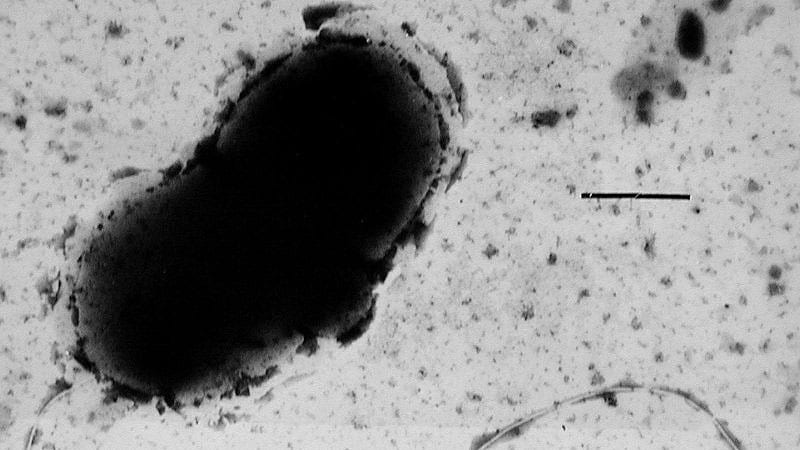Link Between Desulfovibrio Bacteria and Parkinson's Disease
Grunnleggende konsepter
Specific strains of Desulfovibrio bacteria may contribute to Parkinson's disease by inducing alpha-synuclein aggregation.
Sammendrag
The study suggests that Desulfovibrio bacteria could be linked to Parkinson's disease by causing alpha-synuclein aggregation. The research indicates potential for screening and targeted removal of harmful bacteria. However, the findings are preliminary and more research is needed to understand the implications fully.
- Desulfovibrio Bacteria and Parkinson's Disease
- Specific strains may cause PD by inducing alpha-synuclein aggregation.
- Research Methodology
- Study involved fecal samples from PD patients and healthy individuals.
- Desulfovibrio strains from PD patients led to more alpha-synuclein aggregates in worms.
- Implications and Caution
- Early stage research with a small sample size.
- No current clinical implications for screening or treatment.
- Future Research
- Comparative genomics studies needed to identify genetic differences.
- Understanding the role of gut microbiome in PD is still in its infancy.
Tilpass sammendrag
Omskriv med AI
Generer sitater
Oversett kilde
Til et annet språk
Generer tankekart
fra kildeinnhold
Besøk kilde
www.medscape.com
Common Gut Bacteria Linked to Parkinson's Disease
Statistikk
Desulfovibrio bacteria were more prevalent in PD patients.
Worms fed Desulfovibrio bacteria from PD patients had more alpha-synuclein aggregates.
Desulfovibrio strains from PD patients induced larger alpha-synuclein aggregates.
Sitater
"Our findings indicate that specific strains of Desulfovibrio bacteria are likely to cause Parkinson's disease." - Per Erik Saris
"Understanding the role of the gut microbiome in influencing PD is in its infancy." - James Beck
Viktige innsikter hentet fra
by Megan Brooks klokken www.medscape.com 05-12-2023
https://www.medscape.com/viewarticle/991885
Dypere Spørsmål
What are the potential implications of targeting Desulfovibrio bacteria for PD treatment?
The potential implications of targeting Desulfovibrio bacteria for Parkinson's disease (PD) treatment could be significant. If further research confirms the role of these bacteria in PD development, targeting them could lead to novel therapeutic approaches. By screening for and selectively removing harmful Desulfovibrio strains, it may be possible to reduce the aggregation of alpha-synuclein protein, a key feature in PD pathology. This targeted approach could potentially slow down disease progression or even prevent the development of PD in at-risk individuals. However, more research is needed to fully understand the relationship between Desulfovibrio bacteria and PD before any treatment implications can be implemented.
How might the findings of this study impact future research on Parkinson's disease?
The findings of this study could have several implications for future research on Parkinson's disease. Firstly, it sheds light on the potential role of gut bacteria, specifically Desulfovibrio strains, in the development of PD. This opens up a new avenue of investigation into the pathogenesis of the disease, focusing on the gut-brain axis and the influence of the microbiome on neurodegenerative disorders. Future research may delve deeper into the mechanisms by which Desulfovibrio bacteria induce alpha-synuclein aggregation and explore potential therapeutic interventions targeting these bacteria. Additionally, this study underscores the importance of considering environmental factors, such as gut microbiota, in understanding the complex etiology of PD.
What other factors could contribute to the development of Parkinson's disease beyond gut bacteria?
While the study suggests a potential link between Desulfovibrio bacteria and Parkinson's disease, it is essential to recognize that PD is a multifactorial disorder with various contributing factors beyond gut bacteria. Genetics play a significant role in PD susceptibility, with mutations in genes like SNCA and LRRK2 implicated in familial forms of the disease. Environmental factors, such as exposure to pesticides or heavy metals, have also been associated with an increased risk of PD. Inflammation, oxidative stress, mitochondrial dysfunction, and protein misfolding are among the biological processes thought to contribute to PD pathogenesis. Future research should continue to explore the interplay between genetic, environmental, and microbial factors in the development and progression of Parkinson's disease.
0
